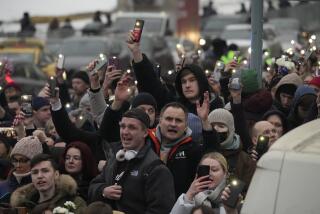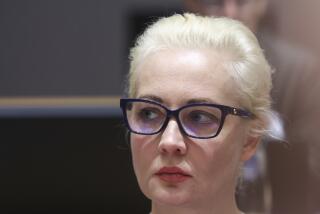Yeltsin’s ‘Defender’--His Mother--Dies in His Moment of Need
- Share via
MOSCOW — When Boris Yeltsin was a boy and his hot-tempered father took the strap to him, his mother would weep and try to snatch the weapon away.
“She always defended me,” Yeltsin wrote in his autobiography.
On Monday, a spokesman for the Russian president announced that Klavdiya Vasiliyevna Yeltsina, 84, had died. After three heart attacks in the last year, her heart gave out Sunday as she lay in a special Kremlin hospital.
In the midst of Yeltsin’s all-out struggle for political survival, he had lost his oldest defender, a deep personal blow that supporters worried might weaken him just when he needs to be strongest.
“It’s very important now to take care of Boris Nikolayevich, how he feels and his health, since Mama for him was a very, very close and dear person,” said Gennady E. Burbulis, formerly Yeltsin’s closest adviser.
Yeltsina’s funeral is expected to take place today at Moscow’s historic Novodevichy Cemetery, where many famous figures of Russian arts and politics are interred.
Her death, with the grief it brings Yeltsin, adds a psychological wild card to the performance of a president already known for his erratic behavior, including a tendency to fall out of sight at critical political moments.
“He does have that habit,” said lawmaker Lev Ponomarev, a strong Yeltsin supporter. “But this time he has a reason.”
Since he went on national television Saturday night to rock the country with his announcement that he would rule by decree until a referendum April 25, Yeltsin has not appeared in public. He had been expected to attend a Monday evening rally of more than 2,000 supporters in a central Moscow cinema, but instead sent his chief of staff, Sergei A. Filatov.
In past months, Yeltsin has repeatedly walked out of sessions of the conservative Congress of People’s Deputies when votes went against him and stayed away for days. His most noticeable and disconcerting absence came in the fall of 1991, when the Soviet Union was falling apart in a snowballing process and there was no word from him for days at a time.
This time, Yeltsin’s pause may be calculated as well as spurred by a mourning period.
Burbulis, long known as Yeltsin’s chief tactician, said, “The president has done everything. Now the Russian population has become the main political force. Nothing else is needed from the president.”
Yeltsin has proposed that a national referendum give people the chance to reaffirm their confidence in him and vote in a new constitution, one that would do away with the Congress that has blocked him at every turn and bring early elections to its smaller standing legislature, the Supreme Soviet.
Although he made no appearances, Yeltsin signaled Monday that he plans to continue work as usual, issuing several routine decrees, from orders on the hard currency earnings of the oil and gas industries to support for Russian associations abroad.
He did not, however, issue the order everyone was waiting for, the document officially declaring his temporary rule-by-decree and announcing the April 25 vote.
The delay brought speculation that Yeltsin might be softening his stance after running into strong opposition from the Constitutional Court, Russia’s highest judicial body, which ruled Yeltsin’s actions unconstitutional today.
“What’s the rush?” First Deputy Prime Minister Vladimir F. Shumeiko asked.
Chief of Staff Filatov said all the documents needed for the start of the new regime had been delivered to Yeltsin by Saturday evening, and remained with the president.
The mystery over the decrees underscored Yeltsin’s custom, especially striking during this crisis, of playing a lone hand. Both the chairman of the Constitutional Court, Valery D. Zorkin, and Vice President Alexander V. Rutskoi have complained of being unable to get in touch with him, despite their special phone lines.
A close adviser said last week that he and other aides put together their recommendations for the president but that Yeltsin would then contemplate them in solitude and come up with his own, often surprising, moves.
“Very many decisions, especially at such crisis moments, are taken by him on his own,” the official said, speaking on condition of anonymity. “As a rule, his apparatus and advisers are used after that to dress the ripened decision in a legally correct form.”
Yeltsin’s enigmatic style has often led to his advisers being blamed for his mistakes. Lawmakers angry about his intent to rule by decree have even ordered the chief prosecutor to look into bringing criminal charges against the aides who helped him prepare his tactics and documents.
“Apparently, the president has fallen victim to irresponsible political plotters,” deputy Igor Muravyov said Sunday. “What good is a manipulated president?”
On Monday, however, concern focused not on manipulation but on the chance that Yeltsin would succumb to one of the dark mood swings he is reportedly prone to, this one triggered by the death of his mother.
“He just has to hold on,” Ponomarev said.
Yeltsin’s personal loss did not appear likely to lead hostile lawmakers to soften their attacks. Even if they feel personal sympathy, the political battle has grown too ugly for moments of kindness.
“We thought of expressing our condolences but failed to do so,” said opposition lawmaker Andrei Golovanov. “It seemed to be inappropriate for the moment.”
Descriptions of Yeltsina’s character made her sound like a classic, salt-of-the-earth Russian peasant woman, self-sacrificing and gentle.
The Izvestia newspaper reported that she knitted socks for Yeltsin and the rest of her family out of wool she carded herself, and put up homemade pickles and preserves.
More to Read
Sign up for Essential California
The most important California stories and recommendations in your inbox every morning.
You may occasionally receive promotional content from the Los Angeles Times.













